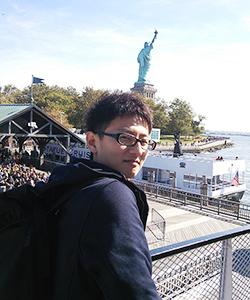Content of the study program
At the Hoshino Group, the Biomedical Engineering Department, School of Engineering, University of Connecticut, I studied a fetal model. According to the World Health Organization (WHO), a pregnancy-related death is 25 times more likely for a pregnant woman in a developing country than a pregnant woman in a developed country. To reduce this statistic, we need fetal Doppler monitors to measure the heart rate of fetuses because the heat rate allows abnormalities to be detected early. In this program, I studied a fetal model that would be useful for repairing broken monitors. More concretely, I conducted experiments to produce and reduce the size of fetal models. (Smaller models should be less expensive and cost-effective in developing countries.) Moreover, I presented my research in front of students belonging to the Biomedical Engineering Department.
Study results
Although I belong to the Department of Applied Mechanics and Aerospace Engineering in Japan, I worked as a student in the Biomedical Engineering Department at the University of Connecticut, allowing me to obtain a lot of new knowledge. Additionally, my English skills improved immensely. Although I could not understand what people said when initially arriving at the university, especially other foreign students (Indians and Mexicans, for example), I quickly learned to adapt. The ability to interact with people with different accents significantly improved my English skills and expanded my vocabulary, especially with regard to technical terms.
My experience abroad
Besides conducting research, I joined the activities held by a group called Japan Student Association. Most of the participants liked or were interested in Japan. We not only spent leisure time together but also organized workshops. For example, during a formal discussion on the relationship among Japan, China, and South Korea, I learned a lot by observing those who did not belong to any of these nationalities. I was also surprised how eager American students were regarding the relationship among the three countries. At times, I felt overwhelmed when I was talking with my peers because they were using several languages almost simultaneously, including English, Chinese, Japanese, and German. Although you may be admired if you speak English in Japan, it was quite natural to be able to speak at least two languages and it was not uncommon to find people on campus who were fluent in three languages. With regard to exploring the region, I asked others for recommendations and directions via a train, as I had no access to the Internet during the visits, which was a very good experience as I was able to explore like a local while improving my English speaking skills.
Influence on my future career

Although I found many positive aspects of living abroad for a month, I personally feel that I am better suited to living in Japan. Therefore, my goal did not change; I hope to get a post at a Japanese manufacturer. However, I thoroughly enjoyed this overseas program and the opportunity to experience various cultures. I was able to work in a place where I meet people from all over the world. In addition, I had the opportunity to talk with students in the Master’s and doctoral programs in the United States. While it seems customary for Japanese science and engineering students to start working after completing their Master’s degree, my conversations have made me reconsider my career possibilities that I get a post after completing doctoral program.


